VankaD/iStock/GettyImages
It's disheartening to bite into one of your homemade pickles only to find it lacks flavor or is soggy instead of crisp. You help ensure the crispness and flavor of your finished pickles by soaking them before pickling to improve their texture and taste. Whether you soak them in ice water, salted water or a lime-water solution, an overnight soak is an important step in many recipes to create quality pickles that you will love.
Pickling Basics
There are two main categories that all pickles fall into -- fresh or fermented. Fresh pickles use a vinegar-based brine to preserve fresh cucumbers for canning. Fermented cucumbers are partially decomposed, or fermented, by bacteria to create lactic acid that also preserves the cucumbers. Both types are commonly soaked in a solution to promote crispness, add flavor and help control the safety of the finished product. When making any pickles, it is important that you follow a tested recipe from a reputable source to ensure you are making a product that is safe for canning and shelf storage.
Ice Water Bath
One common way to help improve pickle crispness is to simply soak them in ice water for four to five hours before pickling. Fill your cleaned sink or a large food-safe container about halfway with ice and add water. Place your cleaned pickling cucumbers, with blossom ends removed, in the water and allow them to soak. Replace the ice as needed to keep the water cold throughout the soaking process, or if possible, refrigerate the entire container throughout the soaking period. After five hours, drain the water and proceed with your pickling recipe.
Saltwater Brining
When making fresh cucumbers, saltwater soaking, or brining, is commonly used to remove excess water from cucumbers and add flavor to vegetables before pickling. Fresh cucumbers are soaked in a salt-and-water brine overnight before being packed into jars and covered with their final pickling liquid. Salt is also used in making fermented pickles; it controls fermentation by stopping spoilage. Soaking in a saltwater brine allows the correct bacteria to ferment and break apart the sugars in cucumbers to create lactic acid. The salt prevents decomposition caused by enzymes present on cucumbers. It also prevents spoilage microorganisms from taking over and creating off-flavors and spoilage in the finished pickles.
Lime-Water Soaking
Another soaking solution to help improve pickle crispness is a lime-water solution. Using food-grade lime mixed with water, cucumbers are soaked for 12 to 24 hours before pickling. Although once common, this process is not used as frequently as in the past. Because lime is alkaline, it changes the pH of pickles and can cause spoilage if the excess lime is not removed. If you use lime, ensure that you rinse and resoak the cucumbers in fresh water for one hour. Then repeat this rinsing and resoaking two more times before using the cucumbers in your recipe.
Related Articles
Substitutes for Alum in Pickling

How to Add Fresh Cranberries to Any ...
How to Ferment Watermelon

How to Make Pickle-Infused Vodka

How to Substitute Dried for Fresh Dill ...
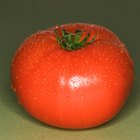
How to Blanch, Peel, & Freeze Whole ...
How Long Can Canned Pickles Stay Good?
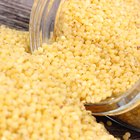
How to Ferment Whole Grains

How Much Lemon Juice for Two Quarts of ...
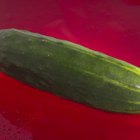
How to Convert Sour Pickles to Sweet ...

How to Store Brussels Sprouts

Can I Make Pickled Eggs by Putting ...

How to Preserve Chestnuts
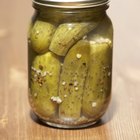
What Are the Seeds in Pickle Jars?
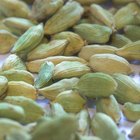
How to Remove a Cardamom Seed From a Pod

How to Blanch Frozen Shrimp

How to Pickle Brine Sausage
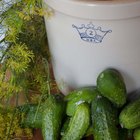
How to Pickle in Stone Crocks
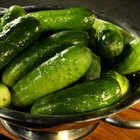
How to Make Cucumber Kimchi

How to Make Blueberry Jam
References
Writer Bio
Based in Portland, Ore., Maxine Wallace is a writer with more than 12 years of experience. With a bachelor's degree in journalism and experience working on marketing campaigns for large media agencies, she is well-versed in multiple industries including the Internet, cooking, gardening, health, fitness, travel and holistic living.